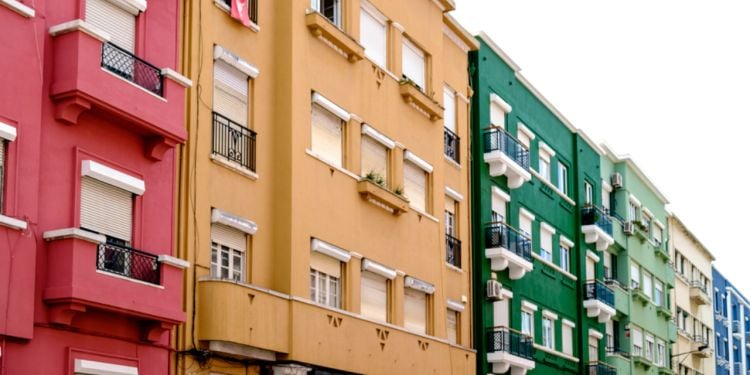
If you've lived in Portugal for a while and plan to build a future in this country, you may want to explore options beyond rent and look into buying property. You may also be pleased to learn that buying property in Portugal can be a great investment opportunity. This article looks into the process of buying property in Portugal, real estate investment opportunities, property prices, and more.
Is it worth buying property in Portugal?
Portugal has a dynamic real estate market. Even in the aftermath of the COVID pandemic, real estate prices continue to rise, and properties in popular regions are selling like hotcakes. There are several reasons for Portugal's popularity in the real estate world.
Although property prices have been on the rise and rent values are downright ludicrous for the local purchasing power, Portugal still offers some of the most affordable real estate in Western and Southern Europe. And though the capital city, Lisbon, can no longer be considered the “cheap deal” it once was, Porto can still be quite affordable if you're coming from North America, Scandinavia and Western Europe. Be that as it may, property prices continue to rise. Since January 2015, the average square meter price in Lisbon has gone up from 1,300€ to a staggering 3,859€. In central Lisbon, in neighborhoods like Baixa, Bairro Alto, Chiado and Rossio, property prices have risen to 5,349€ per square meter (July 2023 figures), an extraordinary 167% leap in just a little over 8 years! Unsurprisingly, the same thing goes for Porto, with the city experiencing the highest property prices ever recorded. If we also look at the numbers since January 2015, the average square meter price in the metropolitan area has gone up from 994€ to 2,500€. In the city center, in neighborhoods like Cedofeita, Santo Ildefonso, Sé and São Nicolau, property prices have reached 3,865€ per square meter (July 2023 figures), which translates to a 160% increase.
Furthermore, Portugal is a popular tourist destination, having welcomed close to 28 million visitors in 2019 alone (and 23 million in 2022, in the post-COVID recovery). Thus, renting out the property you own during the high season used to be quite profitable, leading to further speculation in property prices. To tackle this issue, new legislation has deemed it illegal to open up new Airbnbs in Lisbon, Porto and the Algarve, so you won't be able to rent your property to tourists (legally) if you're away from the city. According to local law, rental contracts must have a minimum term of 12 months. Keep in mind that the rental income tax rate in Portugal currently stands at 28%, with repair and maintenance costs being deductible.
Moreover, with social unrest rising due to the fact that people are no longer able to buy or rent in the cities they work or study in, the local government has also terminated the once-popular Golden Visa Scheme, which means foreign investors can no longer live legally in the country and apply for citizenship after 5 years just for buying 500,000€ worth of property in the capital.
Finally, although Portugal used to boast a pretty friendly tax scheme for foreign residents, the government is currently planning to get rid of the Non-Habitual Residents (RNH) scheme in 2024. This code provided tremendous tax benefits for digital nomads establishing themselves (and their businesses) in the city for a period of 10 years. If your line of work falls within one of the designated categories, you could enjoy a flat 20% tax on your income, a percentage that Portuguese workers (or foreign workers without the digital nomad visa) reach when earning over 1,961€/month. That being said, if you made more than that amount, you'd be saving on taxes by adhering to the visa.
As you can see, property purchase in Portugal is not all sunshine and rainbows. Expats may have to deal with complicated purchase procedures (especially when taking out a mortgage), high taxes, expensive legal fees, deceitful real estate agents, and an overall poor attitude from the locals, which have been regarding digital nomads as one of the main causes, along with tourism, for the current housing crisis.
This is why it is absolutely essential that you do proper research before committing to a property purchase.
The process of buying property in Portugal
The majority of Portuguese residents own the properties they live in. Renting is, of course, also popular; however, owning a home is significantly more prevalent. Generally, there are no restrictions or complications for expats who want to purchase property in Portugal, though things are changing quickly, and certain political parties have been calling for a ban on the purchase of houses/apartments by foreign citizens.
To purchase property in Portugal, you will need to go through several steps:
First, you will need to apply for a tax ID number (Número de Identificação Fiscal aka Número de Contribuinte). The process is quite straightforward, and you will easily get the papers you need from your local tax office. To make things even easier, you can start by opening a bank account in Portugal (you will need one to purchase property), and you will automatically get a tax ID number.
Now, you can dive into your property search. If you are new to Portugal and are not familiar with the real estate market, it's best to work with an experienced local estate agent.
Real estate agents in Portugal need to be government-registered and in possession of a license number (Associação de Mediadores Imobiliários). To find out if the agent you are planning to work with is officially registered, you can contact the Instituto da Construção e do Imobiliário.
Another important thing to keep in mind when working with a real estate agency is that real estate agents in Portugal work in the interests of the seller since they are the ones paying their commission fee. The good thing about this is that you won't have to pay agent fees when purchasing a property. On the other hand, the real estate agent will look out for the seller's interest before yours, which is why it is good practice to also take independent advice before signing any contracts.
If you do decide to go through a real estate agency, here's a list of the biggest institutions in Portugal:
Once you have found the property you are interested in, it's time to make an offer. This is the key part of the buying process, and it's highly recommended to have an independent solicitor by your side to guide you through this stage. You will also need to employ a notary to oversee the transaction. You can search for one locally or through a large directory like the European Directory of Notaries. If your offer is accepted, your notary will review the transaction and check the property you are about to buy. They will typically do so via the Land Registry and Inland Revenue to make sure there are no outstanding issues with the property you are about to buy.
After agreeing on a price with the seller, you will have to sign a Contrato de Promessa de Compra e Venda (CPCV), a legal contract where both you and the other party agree to move forward with the deal and set a completion date for the transaction. Usually, a deposit is agreed upon as a guarantee. If you back down from the deal, the seller gets to keep your deposit. On the other hand, if it's the other party that breaches the contract, they are legally obliged to return your deposit in double. Should you need to take a bank loan, please be aware banks are only able to lend 90% of the total loan value, meaning you need to have the remaining 10% as a downpayment.
Finally, you will need to sign the Deed of Purchase and Sale (Escritura Pública de Compra e Venda), after which you can register the property in your name.
Taxes on property purchase and sale in Portugal
Transaction costs associated with purchasing property in Portugal are quite high. You should expect to pay the IMT (tax over property transactions), stamp duty, the cost of the House Deed, and, if you need to rely on a loan, the respective banking fees ( stamp duty). As an example, if you want to buy an apartment in Portugal for 250,000€ and do not need financing, expect to pay 7,955€ for IMT, plus 2,000€ of stamp duty (0,8% of the total sale) and around 1,000€/1,500€ for the House Deed. If you need a bank loan for 80% of the purchase value (the highest cap in Portugal), you should add 1,200€ (0.6% stamp duty for a 200,000€ loan) to the tally.
If it's the other way around and you're trying to sell, you should expect to pay real estate agent fees (usually 5% of the sale value), value-added tax over those fees (23% VAT) and other related legal fees. Plus, if you don't invest your capital gains into another property, you will have to pay income tax (IRS) over 50% of the amount you made. For example, if you had originally bought your property for 200,000€ and are now selling it for 250,000€, you've had a capital gain of 50,000€. However, you can deduct repairs, maintenance expenses and real estate agent fees. For simplification purposes, let's assume you never had any other deductible expenses aside from the agent fees (5% of 250,000€ = 12,500€). This sum will be deducted from the initial 50,000€, bringing your capital gains down to 37,500€. As mentioned above, the IRS will only be applicable to 50% of your gains, which means 18,750€ will be subjected to tax. If you are a legal resident and pay your taxes in Portugal, the amount you will effectively pay will depend on your other sources of income and annual deductions, with current tax brackets ranging between 14.5% and 48% (for higher-income households/individuals). However, if you're living in another EU country, an additional 5% will be added to your bracket as a “solidarity tax”. Finally, if you live and pay taxes outside the EU, then you will have to pay a 28% flat tax over 100% of your capital gains: in this case, you'd pay 10,500€ (37,500 * 28%) just in taxes for selling your property.
Property tax in Portugal
Property tax (IMI – Imposto Municipal sobre Imóveis) is paid by property owners in Portugal. IMI is managed by your local municipality and is calculated based on the value of your home. Keep in mind this doesn't necessarily apply to the amount you paid for the property but to the VPT (Valor Patrimonial Imobiliário), an index that takes into account the size of the property, how old it is and where it's located. Considering housing prices in Portugal are through the roof, the VPT is usually lower than the current property market values (translating to lower taxes). If you live in an urban area, IMI rates vary from 0.3% to 0.45% of the home value. If you own a property valued under 125,000€, you may benefit from a three-year exemption — but you do have to live in the said property yourself.
Good to know:
IMI only applies to property owners, and tenants don't need to pay this tax.
AIMI (Adicional Imposto Municipal Sobre Imóveis) is an additional property tax that was introduced relatively recently — in 2017. AIMI applies to homeowners whose property is valued (VPT) at 600,000€ or above.
We do our best to provide accurate and up to date information. However, if you have noticed any inaccuracies in this article, please let us know in the comments section below.












Comments
1Thank you. Very informative and nice to have a guide that tells you everything. However, could you also do a guide on what the requirements, pitfalls etc are when selling a property i.e. tax implications, fees, etc.